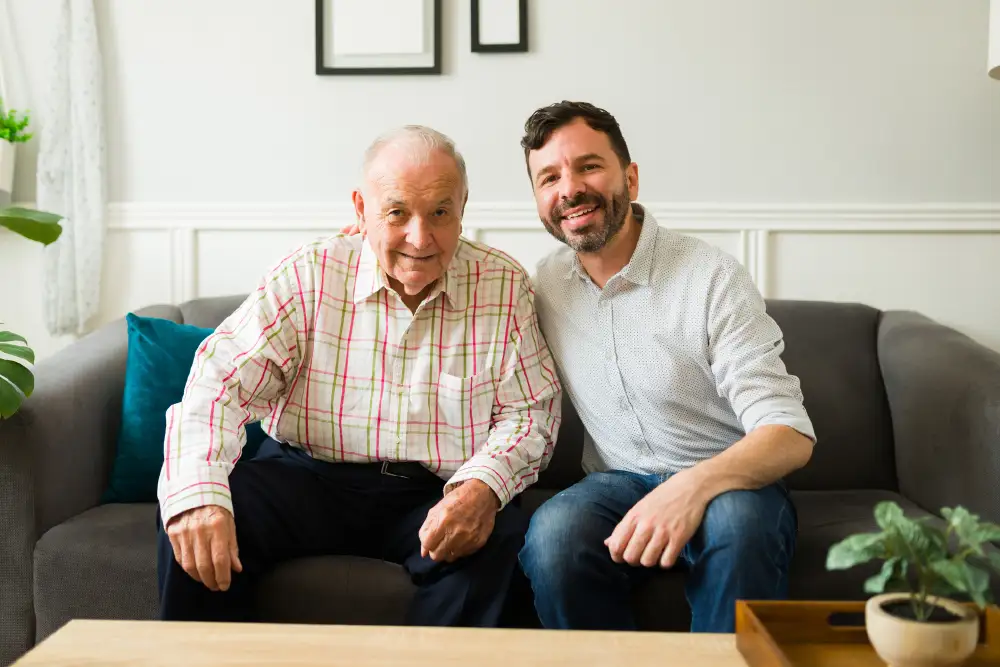Navigating the 7 Stages of Lewy Body Dementia
Date: June 24, 2025 | Article | Reading Time: minutes
Lewy body dementia is a progressive form of dementia that affects both cognitive and motor functions. Understanding the 7 stages of Lewy body dementia is crucial for preparing for the changes a loved one will experience over time. Each stage presents unique challenges, and being aware of them can help caregivers provide the necessary support and plan ahead.
At The Delaney® at The Vale, we understand the emotional toll Lewy body dementia can take on families. Our specialized Memory Care program is here to offer compassionate support, expert care, and guidance every step of the way.

What Is Lewy Body Dementia?
Lewy body dementia is a type of dementia caused by abnormal protein deposits—called Lewy bodies—that develop in nerve cells in the brain. These deposits affect brain function, leading to symptoms such as:
- Cognitive decline and forgetfulness
- Visual hallucinations
- Parkinson’s-like motor symptoms (tremors, stiffness)
- Sleep disturbances and fluctuations in attention and alertness
Because symptoms often overlap with other forms of dementia and Parkinson’s disease, diagnosis can be complex. However, early detection is critical to planning for appropriate care, safety and support.
The 7 Stages of Lewy Body Dementia
Lewy body dementia progresses gradually over time, with symptoms evolving in a way that can be difficult to predict. Learning about the 7 stages of Lewy body dementia helps caregivers and families anticipate changes, navigate important transitions, and make informed decisions about care and support. While every person’s experience with this form of dementia is unique, these general stages offer a helpful framework for what to expect.
Navigating these stages can be emotionally overwhelming, but knowing what may lie ahead allows families to offer the right support—and to seek additional help when needed. Below, we outline each stage to help you better understand the journey your loved one may be facing.
Stage 1: No Noticeable Symptoms
In this earliest stage, changes are happening in the brain, but there are no outward signs. Understanding risk factors and maintaining regular health screenings can help in early recognition.
Stage 2: Mild Forgetfulness
Subtle signs of cognitive decline appear, such as occasional memory lapses or struggling to find the right words. These changes are often mistaken for normal aging.
Stage 3: Increased Cognitive Impairment
Forgetfulness becomes more noticeable. A person may have trouble concentrating, following conversations, or managing complex tasks like finances. Caregivers should start documenting symptoms and seek a medical evaluation if concerns grow.
Stage 4: Early-Stage Dementia Becomes Clear
At this point, a diagnosis is often made. Symptoms become more evident, including confusion, mood swings, and difficulty handling daily activities. Establishing structured routines and offering supportive care are essential to maintaining quality of life.
Stage 5: Mid-Stage Dementia – Loss of Independence
During this stage, cognitive decline is significant. Loved ones may struggle to recognize familiar faces, experience frequent hallucinations, and require constant supervision to stay safe. Professional help becomes increasingly necessary.
Stage 6: Severe Decline and Dependence
Individuals experience profound memory loss, severe mobility challenges, and behavioral symptoms such as agitation or anxiety. Full-time assistance with daily activities like bathing, dressing and eating is required.
Stage 7: Late-Stage Lewy Body Dementia
In the final stage, both cognitive and physical function deteriorate severely. Communication becomes very limited or nonexistent, and complete medical and caregiving support is essential to ensure comfort and dignity.
When To Ask for Help
Recognizing when it’s time to seek professional assistance is vital. Some signs include:
- Inability to manage daily tasks without help
- Frequent wandering or falls
- Hallucinations or delusions that affect safety
- Emotional and physical exhaustion of family caregivers
When caring for a loved one with Lewy body dementia at home is no longer sustainable, transitioning to a specialized memory care community can provide the safety, support, and quality of life they deserve.

How The Delaney at The Vale Can Help
At The Delaney at The Vale, our memory care program is designed specifically for those living with Lewy body dementia and other forms of dementia. Here, residents benefit from:
- A safe, structured environment tailored to individuals experiencing cognitive decline
- Specialized care teams trained in the unique challenges of Lewy body dementia
- Engaging daily programs that encourage socialization and mental stimulation
- Personalized attention and compassionate support that respect each resident’s dignity and individuality
Our goal is to help residents live with comfort, security and joy at every stage of their journey.
Find Compassionate Memory Care at The Delaney at The Vale
Caring for a loved one with Lewy body dementia can be challenging, but you don’t have to do it alone. At The Delaney at The Vale, our memory care program offers expert care, support, and a safe, engaging environment tailored to the needs of those in all stages of dementia. Through thoughtfully designed activities and programs, we help residents stay connected, engaged, and supported at every step.
If your loved one is experiencing cognitive decline and needs more assistance, we’re here to provide the care they deserve. Contact us today to schedule a tour and discover how our compassionate team can help your loved one live with dignity and comfort.
